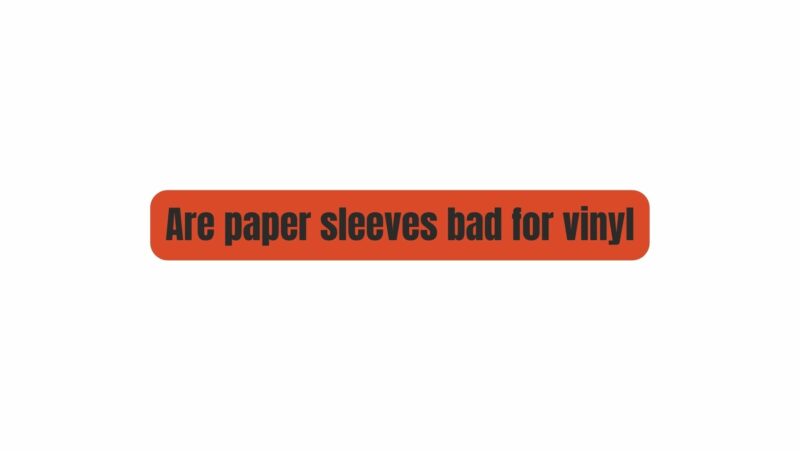Vinyl records have made an astounding comeback in recent years, appealing to audiophiles and music enthusiasts alike for their warm, analog sound. As collectors and new enthusiasts delve into the world of vinyl, they quickly learn the importance of proper care and storage for these fragile analog treasures. One of the most debated topics in the vinyl community is the use of paper sleeves to protect records. Are paper sleeves bad for vinyl? This article seeks to delve into the heart of this controversy, exploring the advantages and disadvantages of paper sleeves for vinyl records.
The Importance of Proper Record Storage
Before we dive into the specifics of paper sleeves, it’s essential to understand why proper record storage is crucial. Vinyl records are delicate, and mishandling or improper storage can result in irreversible damage. Common issues include surface scratches, warping, and groove wear. To ensure the longevity and sound quality of your vinyl collection, it’s essential to take care of them properly.
What Are Paper Sleeves?
Paper sleeves, also known as inner sleeves or dust sleeves, are protective covers that encase vinyl records when they are not being played. These sleeves typically consist of a thin paper or cardboard material and are designed to slide inside the record jacket, protecting the vinyl from dust, debris, and potential scratches.
Advantages of Paper Sleeves
- Dust and Debris Protection: One of the primary purposes of paper sleeves is to shield vinyl records from dust and debris. Dust particles can settle into the grooves of a record, causing pops and crackles during playback. Paper sleeves create a barrier, preventing these particles from infiltrating the delicate grooves.
- Preventing Scuffs and Scratches: When vinyl records are placed directly against the cardboard jacket, there is a risk of scuffs and scratches due to friction. Paper sleeves serve as a buffer, reducing the chances of these imperfections.
- Reduced Static: Some paper sleeves are treated with anti-static properties. Static can attract dust and affect sound quality, so anti-static sleeves can help maintain better audio fidelity.
- Cost-Effective: Paper sleeves are generally more affordable than alternatives like polyethylene or polypropylene sleeves. This cost-effectiveness makes them a popular choice among vinyl enthusiasts, especially those with large collections.
Disadvantages of Paper Sleeves
- Potential for Sleeve Dust: While paper sleeves protect vinyl records from dust, they can sometimes generate dust themselves. Low-quality paper sleeves or those that have been stored improperly can shed particles onto the record’s surface.
- Moisture Absorption: Paper is susceptible to moisture absorption. If records are stored in a humid environment, paper sleeves can become damp, potentially causing damage to the record labels or the vinyl itself.
- Tendency to Stick: Over time, paper sleeves can stick to the vinyl due to moisture or adhesive residue. When removing the record from the sleeve, there is a risk of the paper sticking to the surface and causing damage.
- Not Ideal for Rare or Valuable Records: Collectors with rare or valuable records may prefer alternative sleeves, such as polyethylene or polypropylene, which offer superior protection against potential damage.
Alternative Sleeve Options
- Polyethylene Sleeves: Polyethylene sleeves are a popular alternative to paper sleeves. They are clear, providing visibility of the record’s label, and offer excellent protection against dust, static, and moisture. However, they can be more expensive than paper sleeves.
- Polypropylene Sleeves: Similar to polyethylene, polypropylene sleeves are clear and durable, providing superior protection. They are also slightly more rigid, which can make inserting and removing records easier.
- Rice Paper Sleeves: Rice paper sleeves are a compromise between paper and polyethylene. They offer the benefits of paper sleeves, such as being gentle on records, while also being less prone to moisture absorption.
- Cork and Felt Sleeves: Cork and felt sleeves are designed to protect records during storage and playback. They are particularly useful for preventing static and reducing vibrations but may not be as effective at dust protection.
Conclusion
In the ongoing debate about whether paper sleeves are bad for vinyl records, the answer isn’t a simple “yes” or “no.” Paper sleeves offer advantages such as dust protection and affordability, but they also have disadvantages like moisture absorption and the potential to shed dust. Ultimately, the choice of sleeve material depends on your specific needs and preferences.
If you have a large collection and cost is a significant concern, paper sleeves may be a suitable choice, but it’s essential to invest in high-quality ones. However, if you have rare or valuable records and are willing to spend a bit more for superior protection, polyethylene or polypropylene sleeves may be the better option.
In the end, the key to preserving your vinyl records lies in proper storage and handling. Regardless of the type of sleeve you choose, always store your records vertically in a cool, dry place, and handle them with care to ensure they continue to provide the warm, rich sound that vinyl enthusiasts cherish.

